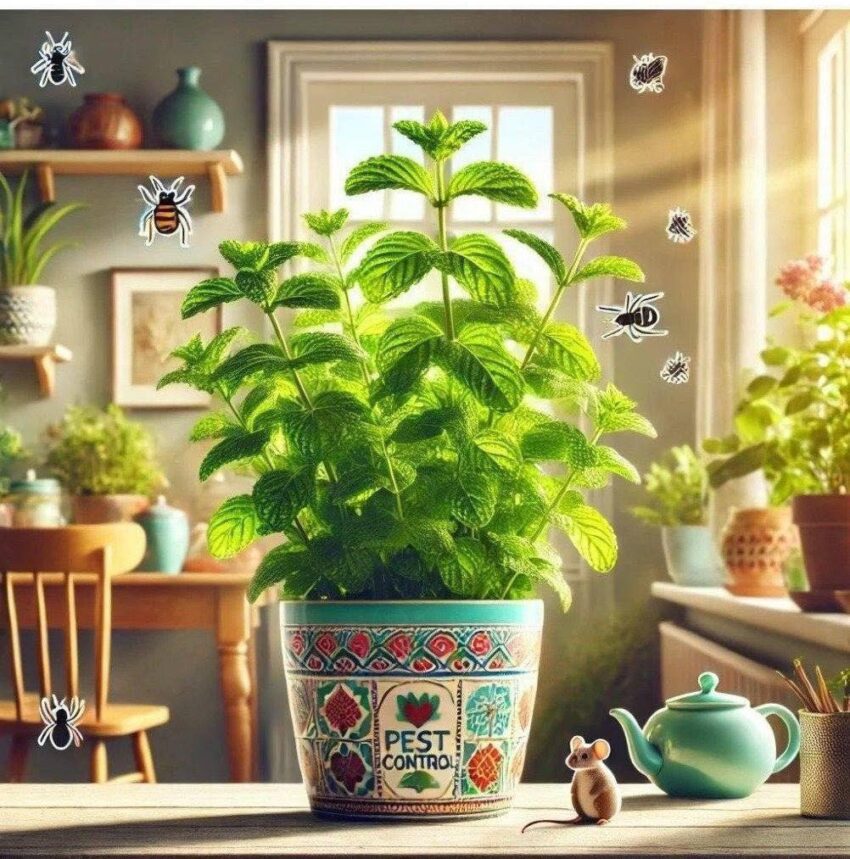Growing a peppermint plant at home can help repel some pests like spiders, mice, and certain insects,
🌿 Why Peppermint Repels Pests
Peppermint contains menthol, a compound that has a strong smell disliked by many pests. Here’s what it does:
🕷️ Spiders
-
Spiders use vibrations and scent to detect surroundings. The strong scent of peppermint oil confuses them and disrupts their navigation.
-
They tend to avoid areas where peppermint is present.
🐭 Mice
-
Mice have a keen sense of smell. The overpowering aroma of peppermint can be overwhelming and unpleasant for them.
-
It may drive them away or make them avoid certain areas.
🐜🦟 Insects (like ants, mosquitoes, flies)
-
Peppermint’s potent aroma can mask the scent trails insects use.
-
Some insects also avoid menthol altogether.
✅ How to Use Peppermint Effectively at Home
-
Grow Peppermint Indoors or Outdoors
-
Keep in small pots near windows, doors, or other entry points.
-
Crush a few leaves occasionally to release the scent.
-
Good for low-maintenance indoor use (it likes sun and moist soil).
-
-
Use Peppermint Oil for Stronger Results
-
Mix 10–15 drops of peppermint essential oil with water in a spray bottle.
-
Spray along baseboards, corners, under sinks, and entry points.
-
Refresh every few days for lasting effect.
-
-
Cotton Ball Method
-
Soak cotton balls in peppermint oil.
-
Place them in cupboards, under furniture, behind appliances.
-
⚠️ Important Limitations
-
Live peppermint plants alone are not strong enough to drive away a full infestation.
-
Mice and insects may adapt if the scent fades or if food sources remain.
-
Not all pests are equally affected — for example, roaches or fleas may not be as deterred.
-
Best used as a preventive tool, not a cure for an existing problem.
✅ Best Use:
Grow peppermint plants + use peppermint oil spray regularly + maintain cleanliness (no crumbs, sealed food, fixed leaks) for the best all-around natural pest control.
can help repel some pests like spiders, mice, and certain insects, but it’s not a perfect or standalone solution. Here’s the why and how it works — and where it falls short:
🌿 Why Peppermint Repels Pests
Peppermint contains menthol, a compound that has a strong smell disliked by many pests. Here’s what it does:
🕷️ Spiders
-
Spiders use vibrations and scent to detect surroundings. The strong scent of peppermint oil confuses them and disrupts their navigation.
-
They tend to avoid areas where peppermint is present.
🐭 Mice
-
Mice have a keen sense of smell. The overpowering aroma of peppermint can be overwhelming and unpleasant for them.
-
It may drive them away or make them avoid certain areas.
🐜🦟 Insects (like ants, mosquitoes, flies)
-
Peppermint’s potent aroma can mask the scent trails insects use.
-
Some insects also avoid menthol altogether.
✅ How to Use Peppermint Effectively at Home
-
Grow Peppermint Indoors or Outdoors
-
Keep in small pots near windows, doors, or other entry points.
-
Crush a few leaves occasionally to release the scent.
-
Good for low-maintenance indoor use (it likes sun and moist soil).
-
-
Use Peppermint Oil for Stronger Results
-
Mix 10–15 drops of peppermint essential oil with water in a spray bottle.
-
Spray along baseboards, corners, under sinks, and entry points.
-
Refresh every few days for lasting effect.
-
-
Cotton Ball Method
-
Soak cotton balls in peppermint oil.
-
Place them in cupboards, under furniture, behind appliances.
-
⚠️ Important Limitations
-
Live peppermint plants alone are not strong enough to drive away a full infestation.
-
Mice and insects may adapt if the scent fades or if food sources remain.
-
Not all pests are equally affected — for example, roaches or fleas may not be as deterred.
-
Best used as a preventive tool, not a cure for an existing problem.
✅ Best Use:
Grow peppermint plants + use peppermint oil spray regularly + maintain cleanliness (no crumbs, sealed food, fixed leaks) for the best all-around natural pest control.
